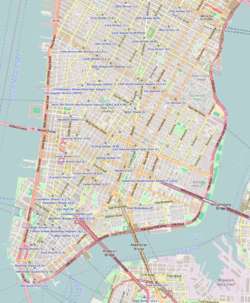Charlton-King-Vandam Historic District
|
Charlton–King–Vandam
Historic District |
|

Federal style row houses at #35 (right) and #37 Charlton Street (c.1820)
|
|
| Location | roughly bounded by King, Varick, Vandam, MacDougal & Houston Sts. and Sixth Ave. Manhattan, New York City |
|---|---|
| Coordinates | 40°43′39″N 74°00′15″W / 40.72750°N 74.00417°WCoordinates: 40°43′39″N 74°00′15″W / 40.72750°N 74.00417°W |
| Built | c.1820s-1840s |
| Architectural style | Federal, Greek Revival, others |
| NRHP Reference # | 73001215 |
| Significant dates | |
| Added to NRHP | July 20, 1973 |
| Designated NYCL | August 16, 1966 |
The Charlton–King–Vandam Historic District is a small historic district located in the South Village area of the Greenwich Village neighborhood of Manhattan, New York City. Designated by the New York City Landmarks Preservation Commission (NYCLPC) in 1966, the district contains "the city's largest concentration of row houses in the Federal style, as well as a significant concentration of Greek Revival houses."
The district includes parts, but not all, of Charlton, King and Vandam Streets between the Avenue of the Americas (Sixth Avenue) and Varick Street (the southern extension of Seventh Avenue), as well as the block bounded by King, MacDougal and Houston Streets and Sixth Avenue. In its designation report, the NYCLPC emphasized that this area was not a modern creation, but had "always been, since its beginning, a distinct and separate neighborhood."
In 1973, the district was added to the National Register of Historic Places.
The Charlton–King–Vandam area was part of the estate of "Richmond Hill", a Georgian mansion built in 1767 and said to be one of the most beautiful mansions in Manhattan. It was used by George Washington during the American Revolution as a headquarters and later became John Adams' Vice Presidential Mansion when the new country's capital was New York City. Aaron Burr bought the mansion, and after living in it for a time and using it as the site of lavish parties, it was Burr who, in 1797, mapped the property, dividing it into lots and laying out the grid of three streets, which would become Charlton, King and Vandam. After Burr's duel with Alexander Hamilton, he lost control of the estate to John Jacob Astor, the leading land developer of the time, who paid off Burr in 1817 and proceeded to develop the area.
...
Wikipedia


